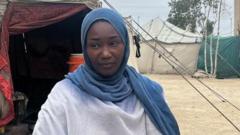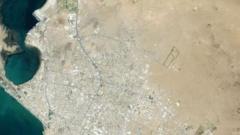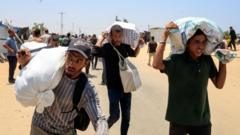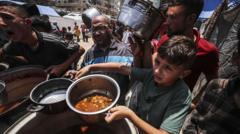Port Sudan, once a refuge from Sudan's civil war, is now suffering from aerial bombardments that have drastically increased water prices, caused electric shortages, and hindered aid efforts. Residents are facing a bleak future as they struggle with basic necessities.
Port Sudan Faces Severe Crisis Amid Ongoing Attacks

Port Sudan Faces Severe Crisis Amid Ongoing Attacks
A week of sustained drone attacks has left Port Sudan grappling with water shortages and energy blackouts, intensifying a humanitarian crisis.
Port Sudan, a city previously seen as a safe haven amid Sudan's devastating civil conflict, is now in turmoil as a result of a week-long series of aerial assaults by the Rapid Support Forces (RSF). The recent wave of drone attacks has led to catastrophic consequences, including a staggering rise in the price of water, exacerbating an already dire humanitarian crisis.
For six straight days, explosions have erupted, targeting essential fuel depots, which have contributed to an ongoing cloud of smoke over the city. Rescue teams are dispatched but face significant challenges in extinguishing the flames. The conflict, ignited over two years ago between RSF leaders and the army, has displaced over 12 million individuals, creating one of the world's worst humanitarian scenarios.
Residents like 26-year-old Mutasim, who fled to Port Sudan for safety, recount the bleak reality. The price for a day’s supply of water surged from 2,000 Sudanese pounds ($3.30; £2.50) to an astonishing 10,000 pounds, leaving families like his with little choice but to sacrifice basic hygiene and sanitation needs.
Although markets remain operational, the struggle for fuel has led to long queues at petrol stations, significantly disrupting daily life. Before this crisis, Port Sudan was relatively peaceful and invigorated by evening gatherings; now, fear permeates the streets.
Mutasim faces further difficulties as power outages have become commonplace. His elderly relative suffers without cooling during the sweltering heat, making life unbearable. Hawa Mustafa, another resident displaced by the conflict, expresses her fears as the drone attacks take a toll on security and stability, leaving her trapped with four children in a shelter devoid of options for escape.
Mariam Atta adds to the grim outlook, stating simply, "life has changed completely," highlighting the psychological torment shared across Port Sudan amid constant anxiety and uncertainty.
Despite the escalation of violence, humanitarian organizations have relied on Port Sudan as a critical aid distribution hub. According to Leni Kinzli of the World Food Programme (WFP), significant portions of the food aid sent to regions in dire need come through this city. However, as attacks increase, concerns rise about the blockade of crucial supplies, leading to further deterioration in the humanitarian crisis.
Shashwat Saraf from the Norwegian Refugee Council warns of the risk to life-saving medical and food assistance, voicing fears that any disruption could have catastrophic effects on the already precarious situation.
At night, a heavy silence falls over the city that once thrived on community and engagement. Currently, residents prefer the safety of their homes while memories of lively past evenings fade beneath enduring conflict and uncertainty.



















